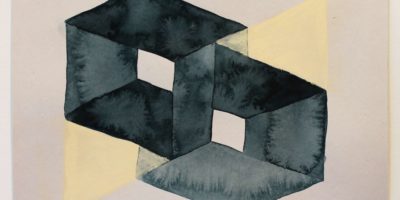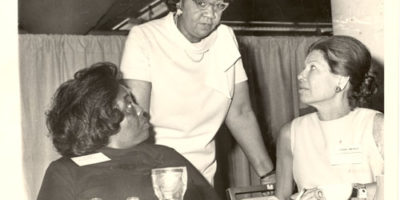Inhuman But Still Humane
Growing Up Golem: How I Survived My Mother, Brooklyn and Some Really Bad Dates (Magnus Books) joins the collection of memoirs about difficult childhoods, a genre that is becoming at times predictable. Donna Minkowitz, however, brings her fierce imagination and compelling prose to Growing Up Golem, making it a notable book this year.
The central conceit of Growing Up Golem is captivating. Minkowitz presents herself as a golem, created and controlled by her wacky, needy, and sexually abusive mother. Minkowitz explains, “A golem is essentially the Jewish version of a creature called homunculus, which the alchemists of the Dark Ages and the Middle Ages made in their little beakers when they wished to create a small personal servant.” In Minkowitz’s hands, this conceit plays out with fascinating consequences.
The quest of the book is Minkowitz’s transformation from golem to human; she desires, secretly, to be a servant no longer for her mother, her sister, or the women she dates. Through that quest, Minkowitz explores her early life with the requisite wry humor that makes the book highly, even compulsively, readable. What lingers is the emotional complexity that Minkowitz evokes but never quite resolves.
Growing Up Golem shines when Minkowitz explores the fanciful and the mythical in the contemporary world. One of the most delightful extensions of her conceit is her portrayal of Richard Goldstein of the Village Voice as a sea-monster. She writes, “Richard and I had spent hours inside his long, dark, tunnelly, smelly office lair talking about our parents, sex with waterbugs, and what it was like to be a fearsome inhuman minority. Sea-monsters smell a little like reptiles, reader.” She spins this fantasy further in ways that are both grotesque and alluring; Minkowitz confides, “I didn’t really mind Richard’s smell… I would wash Richard’s scales with warm sea water as we edited and wrote and talked gay liberation strategy.” Minkowitz’s relationship with Goldstein, like her relationship with her mother, is both loving and troubling, and she conveys the contours of that duality in a deeply satisfying way.
Sexuality is a central theme of Growing Up Golem. Minkowitz’s portrayal of her own adult sexuality is graphic and, at time, disturbing. More disturbing, however, is the sexually abusive and manipulative relationship between mother and child. In the limited literary and popular treatments of sexual abuse where women are the perpetrators, Minkowitz’s memoir tills new and important ground.
As disturbing as some of her portrayals of sexuality are, so is the way Minkowitz treats people in the memoir. For example, her description of working with interns is wry and sardonic, showcasing her talents as a writer and observer, but it has the bite of truth. In this passage, Minkowitz unwittingly demonstrates the inhuman through her cruelty to others. It is unsettling even as Minkowitz argues it is behavior that necessarily comes from considering oneself a golem.
Minkowitz’s early work as a writer for the Village Voice was fiercely political. In 1995, she dressed as a boy to write about the Promise Keepers, an evangelical men’s organization that briefly enjoyed wide popularity. Minkowitz’s investigations into right wing movements required her to cloak aspects of herself and her identity, which she did with apparent ease. Her essays collected in Ferocious Romance: What My Encounters With the Right Taught Me About Sex, God, and Fury (Free Press, 1998) won the Lambda Literary Award.
I remember seeing Donna Minkowitz at The Task Force’s Creating Change conferences in the late 1990s. She was at least half a foot shorter than me, petite, slightly older; she seemed everything that I wanted to be: fierce, outspoken, smart, well-read. Her writing challenged many of us as writers and activists to think more and think better. Then, in the early 2000s, Minkowitz began struggling with a repetitive strain injury. Thus, the silence between her award-winning book in 1998 and this memoir. Growing Up Golem contains all of the power of her earlier work with its sharp political and social analysis, but it is written without the cloak. Growing Up Golem demonstrates Minkowitz’s capacity for personal exposure and vulnerability within her own tribe.
Julie R. Enszer is a Visiting Assistant Professor in the Department of Women’s Studies at the University of Maryland. She is the author of Sisterhood and Handmade Love, and editor of Milk & Honey: A Celebration of Jewish Lesbian Poetry.




